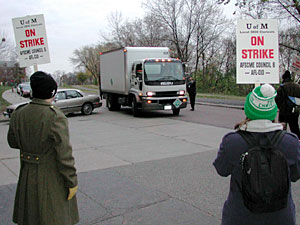| University of Minnesota on strike |
Photos
More from MPR
Your Voice
| ||||||||||||||||||||||||||||
Impact of U of M strike is mostly inconvenience
October 27, 2003
 |
| Picketers at the University of Minnesota try to convince a truck driver to honor their picket line. They failed. (MPR Photo/Marisa Helms) |
Minneapolis, Minn. — It's 5 a.m. and the temperature hovers around freezing. But neither the hour nor the chill have stopped AFSCME workers Sven Erik Olsen, his wife, Bethany Hummel, and fellow striker Bob Carlson from showing up at the loading dock at Dwan Cancer Research Center on the U's Minneapolis campus, picket signs in hand.
Olsen explains they're trying to stop truck drivers from delivering food and supplies. "We're trying to get here early to try to block some shipments in. We're 0 for 1, so far, but it's early yet."
Bob Carlson tries to tell a driver that his Teamsters union has sanctioned the AFSCME strike and he asks him not to cross their line.
"I hadn't heard, that's news to me. I was told I'd be fired if I didn't cross the line," the trucker says.
State law gives the driver little choice. Public employees can only honor a strike by their own union. Private sector Teamsters are another story and unconfirmed reports describe instances this past week of UPS and other delivery drivers refusing to cross AFSCME's lines.
U of M Teamsters president Sue Mauren says supervisors are coming in to do the work of the rank and file drivers. So, while there may be delays, the strike is not bringing university deliveries to a halt.
A non-scientific survey of about a dozen academic departments found a similar sense of inconvenience and not much more.
Those answering phones in the departments of architecture, political science, and forest resources, for example, all say the impact has been minimal because none of the AFSCME workers in those offices are striking. But there are pockets where the absence of striking clerical workers is straining remaining staff members.
Kathy Hansen, a professor in the School of Journalism, says all three AFSCME workers in the journalism school are on the picket lines. She says student assistants and other staff members are covering day-to-day tasks.
"There's a lot of ongoing work that needs to take place in running a department; making sure that the reviews of assistant professors are on track as they go through their annual performance reviews. A lot of the paperwork that comes into the office, processing the mail that comes into the main office every day. So there's just a huge impact," she says.
While AFSCME membership is between 1,800 and 1,900, between 30 to 40 percent of those covered by the contract have chosen not to become full voting members. These "fair share" workers must pay 85 percent of the dues full members pay.
Both union and university officials say they don't have hard numbers on how many "fair share" members are on the picket lines.
Some "fair share" members still at work say they feel no obligation to picket since they don't vote.
Many students feel a mixed sense of kinship with the strikers, as well. The university raised tuition 15 percent this fall to help fill a $185 million budget cut from the state Legislature last session.
Minnesota Student Association President Eric Dyer says there is sympathy for the strikers, up to a point. "Many of us have to hold our classes off campus. Or many of us, just stopped going, and got take-home mid-terms and things like that. It's kind of ridiculous when we're paying for our classes, that we're not getting these services."
Dyer says he feels the union should have been at the state Capitol lobbying lawmakers.
There are no talks of a settlement yet. Meanwhile, another unit, Local 3260, representing the U of M's health care workers, filed an intent to strike with mediators. The local's officials say if there is no agreement with the university on its contract, another 170 university workers will go on strike.
|
News Headlines
|
Related Subjects
|

